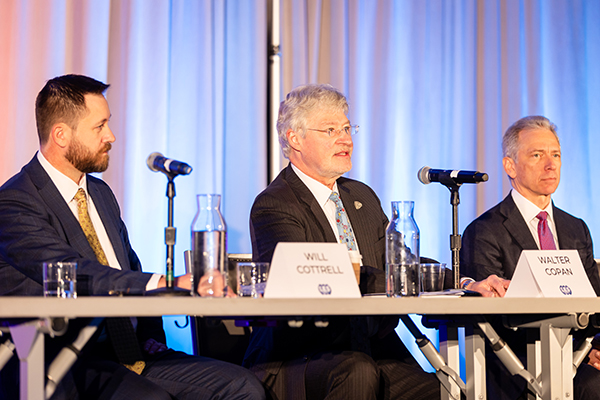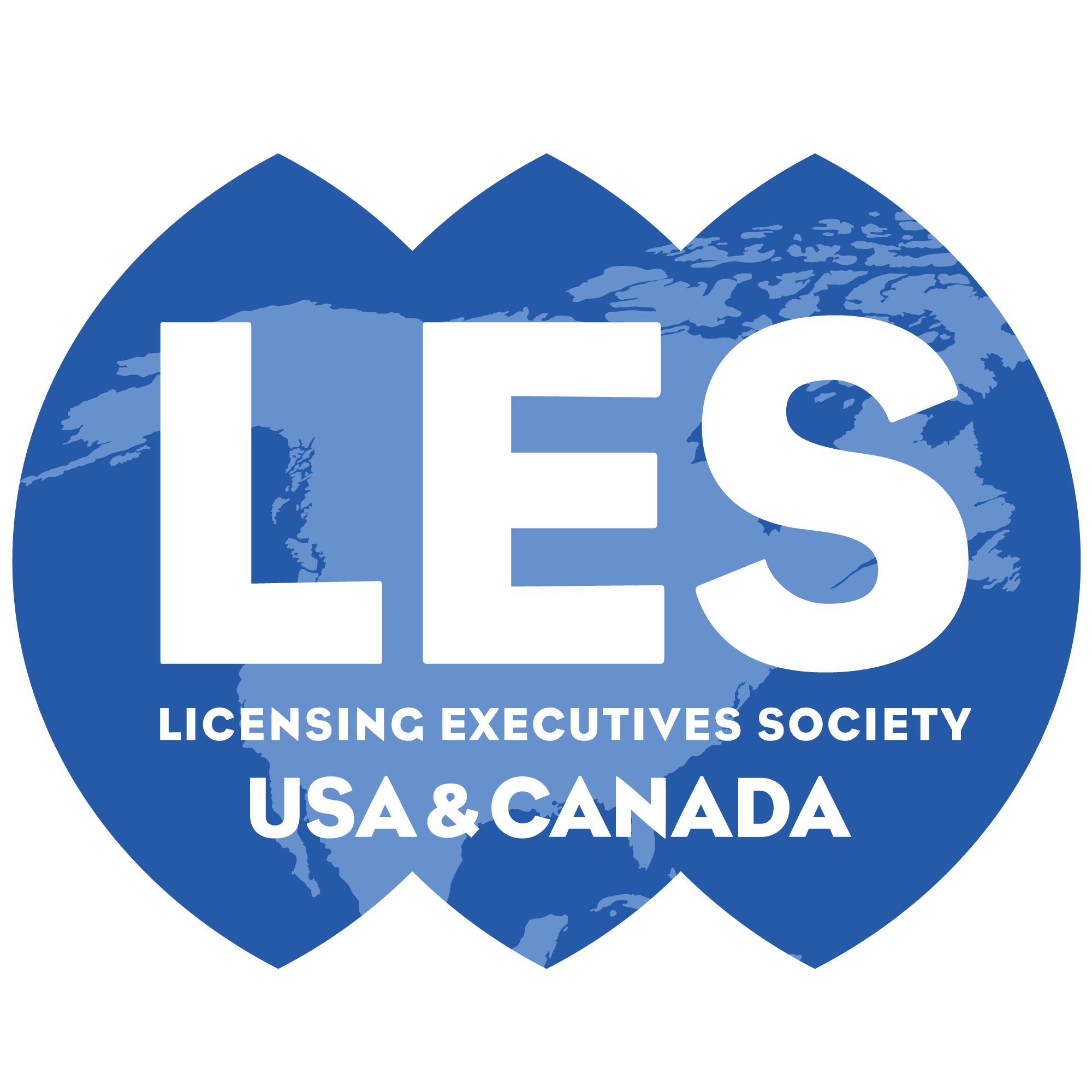
Panelists from left: Will Cottrell, (RTX) moderator; Walter Copan (Colorado School of Mines), and Andrei Iancu (Sullivan & Cromwell LLP).
In this captivating fireside chat, Will Cottrell of RTX led a discussion with Walter Copan, former Under Secretary of Commerce for Standards and Technology, and Andrei Iancu, former Director of the United States Patent and Trademark Office. These eloquent thought leaders provided insights on the CSIS project, U.S. policy challenges and Bayh-Dole, shedding light on what it will take for the United States to continue its technological and innovation leadership.
Dr. Copan discussed The Center for Strategic and International Studies (CSIS) program. He explained, “CSIS is a think tank that’s focused principally on national security issues and international relations that affect global peace and security. The program that Andrei and I launched there is the linkage between innovation and economic security with national security and the central role that intellectual property and standards play in that ecosystem.”
Copan underscored the focus on standards, particularly in education and IP within the United States. He also highlighted the importance of renewing investment in science and technology through key legislation like the Chips and Science Act. Dr. Copan emphasized that clear IP rights are necessary for these investments to yield the necessary returns for the U.S. to regain its position in key innovation markets. He also stressed the significance of inclusivity in the innovation process and applauded policymakers’ efforts in promoting diversity and entrepreneurship. Additionally, he discussed the need to modernize long-standing policies and legislation to unlock the country’s innovation capacity and ensure investments translate into tangible innovation results.
Challenges Facing the U.S.
Andrei Iancu outlined his thoughts on the question, “What are the biggest headwinds the U.S. faces?” He said, “The world is on the cusp of or the beginning stages of the next major industrial revolution.” He gave examples and emphasized the urgency of the global competition in emerging technologies, such as AI, quantum computing, autonomous vehicles, and more. He points out that the leadership position of the United States and its Western allies is currently under threat, citing examples like China dominating in 5G installations and surpassing in patent filings for Deep Learning Technologies. Additionally, he notes that Chinese authors are outpacing Western counterparts in scientific and technical publications. Iancu calls for clear and specific plans from leaders and policymakers to address these challenges and questions the absence of a meaningful debate on America’s innovation policy, urging for a more concrete discussion on fostering innovation in the face of intense global competition.
Responding to the headwinds question, Dr. Copan emphasized the competitive challenges facing the United States today, underscoring the need to level the playing field and refine the nation’s policy framework, particularly in science, technology, and innovation. He highlighted a significant need for more understanding in Congress about these processes. Furthermore, he underscored the importance of identifying investable opportunities, considering the role of intellectual property, and recognizing its long-term value for the nation. He stresses the importance of maintaining agility in a constantly changing and often chaotic environment. He warns that barriers hindering innovation from public and private sector investments could pose a substantial, long-term challenge to the United States that requires urgent attention.
Bayh-Dole Act and Pricing Pressures
When asked about the Bayh-Dole Act, Iancu expressed his concerns, saying, “There is significant pressure right now on the Bayh-Dole Act as a result of the drug pricing debates.” He pointed out that there have been requests from the public and certain members of Congress to utilize the act’s march-in rights to control drug pricing, but the current administration has thus far resisted such actions for a specific drug. However, there is ongoing pressure, with a working group set to release recommendations on whether Bayh-Dole should be used for pricing control. Iancu fears that such a move would disrupt the innovation ecosystem, which relies on universities and research labs. He questions the selective focus on the pharmaceutical industry and the potential implications for other sectors. Ultimately, he stresses the importance of maintaining the long-standing position that using march-in rights for pricing control is inappropriate.
Copan points out a change globally, “Over these past decades, the Bayh-Dole Act, despite the fact that it’s been tremendously transformative for this country, has also been copied. It’s been utilized by many, many other nations around the world.” What was initially a competitive advantage for the U.S. as a policy landscape has benefits that have eroded.
LES and Standards
Dr. Copan answered a question from the audience about IP Standards. He responded, “As former NIST director, I really appreciate the focus that LES is bringing to these standards, several legal topics, as well as the role that standard essential patents play in the global innovation ecosystem.” He emphasized the importance of achieving a return on the significant investments made in research and development. He expresses concern that the current approach to addressing complex challenges in standards development relies too heavily on a separate group of experts to understand the value of both providers and receivers. Despite the challenges in reaching a consensus, he underscores the value of key stakeholders coming together and holding each other accountable in the standardization process.
Dr. Copan commends the national standards policy from the White House for emphasizing the role of inventors, the private sector, the public sector, and subject matter experts in global standards. He advocates for inclusivity and collaboration, acknowledging that roadblocks may arise, but external partners can help ensure a consensus standard that embodies best practices and a code of conduct acceptable to all ecosystem players.
This thought-provoking session illuminated the intersection between innovation, intellectual property standards, and the United States’ continued leadership in technology. The speaker’s insights shed light on the challenges facing the U.S. and the imperative of refining its policy framework.

Get Social